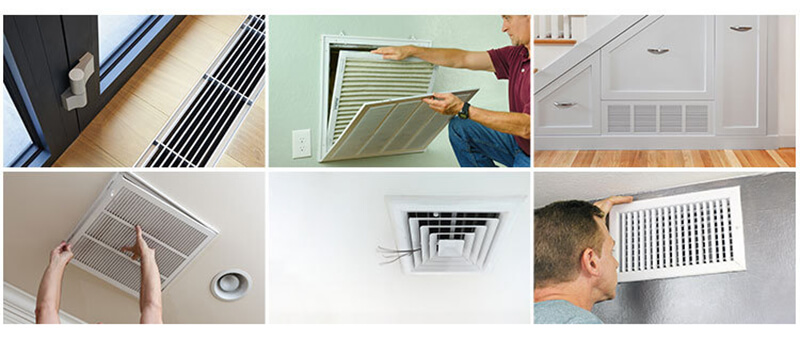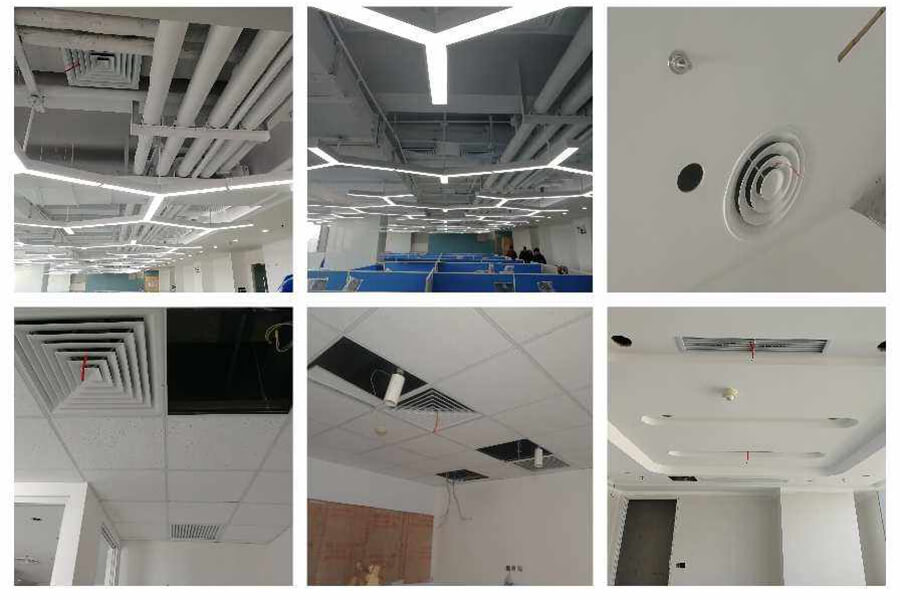Have you ever walked into a room and felt an immediate wave of discomfort from stale, humid air? Or perhaps you’ve noticed an odd smell lingering that just won’t go away? These are common signs that your air diffuser might be past its prime. Air diffusers play a crucial role in maintaining a comfortable and healthy indoor environment by evenly distributing conditioned air throughout a space. When they start to fail, it can lead to a host of problems that affect both your comfort and your wallet.
In this article, we’ll explore the telltale signs that indicate it’s time to replace your old and sweaty air diffuser. We’ll also delve into the benefits of upgrading to a newer, more efficient model and provide tips on choosing the right replacement for your home or office.
Signs You Need to Replace Your Air Diffuser
1. Visible Wear and Tear
One of the most obvious signs that it’s time to replace your air diffuser is visible damage. Look for signs such as rust, cracks, and discoloration on the diffuser. These can not only detract from the aesthetic appeal of your space but also compromise the functionality of the diffuser.
2. Poor Airflow
Another key indicator is reduced or uneven airflow. If you notice that certain areas of your room are not receiving enough air, or if the airflow seems weaker than usual, it could be a sign that your diffuser is clogged or damaged. Proper airflow is essential for maintaining a consistent and comfortable temperature throughout your space.
3. Unpleasant Odors
Old air diffusers can become a breeding ground for mold and mildew, leading to unpleasant smells. If you detect a persistent, musty odor even after cleaning, it’s likely that your diffuser is harboring mold spores. Replacing the diffuser can help eliminate these odors and improve indoor air quality.
4. Increased Energy Bills
Have you noticed a spike in your energy bills? An inefficient air diffuser can make your HVAC system work harder to achieve the desired temperature, leading to higher energy consumption. Upgrading to a new, energy-efficient diffuser can help reduce your energy costs and lessen the strain on your HVAC system.
5. Excessive Noise
Finally, listen for any unusual sounds coming from your air diffuser. Rattling, whistling, or buzzing noises can indicate that the diffuser is not functioning properly. These sounds are not only annoying but can also signal underlying issues that require attention.

Benefits of Replacing Your Old Air Diffuser
1. Improved Air Quality
One of the most significant benefits of replacing your old air diffuser is improved air quality. New diffusers are designed to distribute air more effectively, reducing the concentration of allergens and pollutants. This can make a noticeable difference, especially for those with allergies or respiratory conditions.
2. Enhanced Comfort
Replacing an old air diffuser can lead to better airflow control and temperature regulation. Modern diffusers are engineered to ensure even distribution of air, eliminating hot or cold spots in your space. This enhanced comfort makes your home or office more pleasant to be in.
3. Energy Efficiency
Newer air diffusers are much more energy-efficient. They are designed to work seamlessly with your HVAC system, reducing the workload on the system and thereby lowering your energy bills. By investing in a new diffuser, you can enjoy a more energy-efficient home while saving money in the long run.
4. Aesthetic Upgrade
Modern air diffusers come in a variety of designs that can complement your interior décor. Whether you prefer a sleek, minimalist look or a more ornate style, there are plenty of options available. Upgrading your diffuser not only enhances functionality but also adds to the visual appeal of your space.
Choosing the Right Replacement
Types of Diffusers and Grilles
When it comes to choosing a replacement, understanding the different types of diffusers and grilles is crucial. Here are a few common types:
- Linear Diffusers: Ideal for providing consistent airflow in large spaces.
- Slot Diffusers: Great for spaces requiring discrete installation with flexible airflow direction.
- Ceiling Diffusers: Popular for their ability to distribute air evenly across the room.
Material Considerations
The material of your air diffuser affects both its durability and appearance. Common materials include:
- Plastic: Lightweight and cost-effective, suitable for various environments.
- Aluminum: Durable and resistant to corrosion, offering a sleek look.
- Stainless Steel: Extremely durable and ideal for high-end or industrial applications.
Consider the specific needs of your space when selecting the material.
Size and Compatibility
Ensure that the replacement diffuser is the right size and compatible with your existing HVAC system. Measure the current diffuser and consult with a professional if necessary to avoid any installation issues.
Custom Options
For those looking to make a statement or match a specific design theme, custom options are available. Many manufacturers offer bespoke designs to suit unique aesthetic needs, allowing you to tailor the diffuser to your personal taste or the overall décor of the space.
By understanding these factors, you can make an informed decision when replacing your air diffuser, ensuring improved functionality, energy efficiency, and aesthetic appeal in your indoor environment.

Installation Tips
DIY vs. Professional Installation
When it comes to installing your new air diffuser, you have two main options: DIY installation or hiring a professional.
- DIY Installation: If you’re handy and have some experience with home improvement projects, installing an air diffuser yourself can be a cost-effective option. Make sure to follow the manufacturer’s instructions carefully and use the appropriate tools.
- Professional Installation: Hiring a professional ensures that the diffuser is installed correctly and safely. Professionals can also check for any issues with your HVAC system that might affect the performance of the new diffuser.
Maintenance Tips
Proper maintenance is key to extending the life of your new air diffuser. Here are some essential maintenance tips:
- Regular Cleaning: Dust and debris can accumulate over time, reducing airflow and efficiency. Clean the diffuser regularly with a soft cloth and mild detergent.
- Inspect for Damage: Periodically check the diffuser for any signs of wear or damage. Addressing small issues early can prevent bigger problems later.
- Check for Proper Airflow: Ensure that the diffuser is not obstructed by furniture or other objects. Proper airflow is crucial for maintaining a comfortable indoor environment.
Conclusion
Replacing your old and sweaty air diffuser with a new, efficient model offers numerous benefits, from improved air quality and enhanced comfort to energy savings and aesthetic upgrades. By choosing the right replacement and ensuring proper installation and maintenance, you can enjoy a healthier, more comfortable indoor environment.
Assess your current air diffusers today and consider upgrading to reap these benefits. Whether you opt for a DIY installation or hire a professional, investing in a new air diffuser is a step towards a better, more efficient home or office.
FAQs
1. How often should I replace my air diffuser?
The lifespan of an air diffuser depends on the material and usage, but generally, it’s recommended to replace them every 5-10 years or when you notice signs of wear and reduced efficiency.
2. Can I install a new air diffuser myself?
Yes, many air diffusers are designed for easy installation. However, if you’re unsure or unfamiliar with HVAC systems, it’s best to hire a professional to ensure proper installation.
3. What’s the best type of air diffuser for my home?
The best type of air diffuser depends on your specific needs and preferences. Linear diffusers are great for large spaces, slot diffusers offer flexibility in airflow direction, and ceiling diffusers provide even air distribution. Consider your space and aesthetic preferences when choosing.
4. How can I maintain my new air diffuser?
Regular cleaning, inspecting for damage, and ensuring proper airflow are key maintenance steps. Refer to the manufacturer’s guidelines for specific care instructions.
5. Will a new air diffuser reduce my energy bills?
Yes, a new, efficient air diffuser can help reduce energy bills by improving airflow and reducing the workload on your HVAC system, leading to lower energy consumption.
If you want to know more, please click below:
- Grilles, Registers & Diffusers – The Ultimate Guide
- HVAC Linear Slot Diffusers – The Ultimate Guide
- HVAC Egg Crate Diffuser – The Ultimate Guide
- HVAC Jet Nozzle Diffuser – The Ultimate Guide
- HVAC Linear Bar Grilles – The Ultimate Guide
- HVAC Air Swirl Diffusers – The Ultimate Guide
- HVAC Round Ceiling Diffusers – The Ultimate Guide
- Round Ceiling Diffusers – The Ultimate Guide
- Exhaust Air Louver – The Ultimate Guide
- HVAC Registers – The Ultimate Guide


